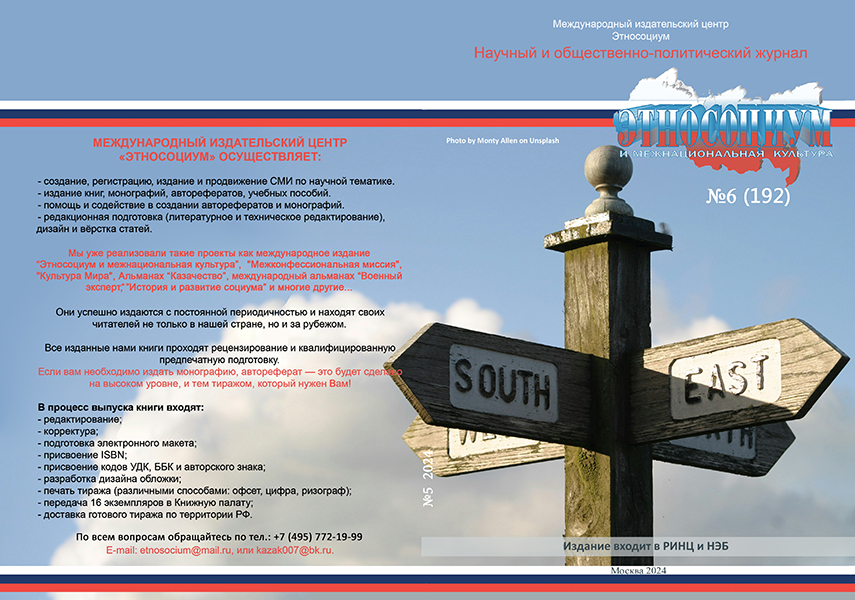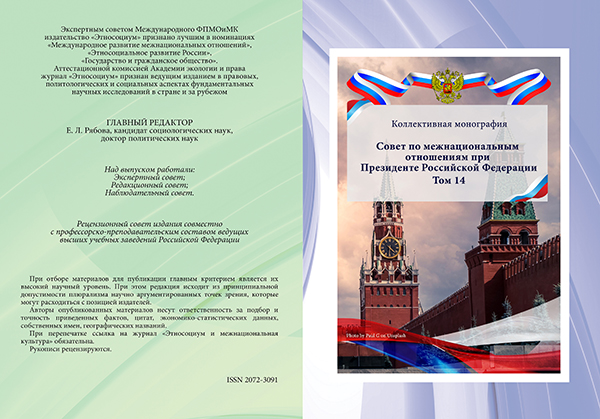

Content
|
CURRENT PROBLEMS OF MODERN SOCIETY
|
|
|
Ryabova E.L., Ternovaya L.O. “Global East”: historical reality or geopolitical fiction
|
8
|
|
Lezina O.V., Ternovaya L.O. New sources for studying political sociology: indices of a beautiful life
|
18
|
|
Gadzhieva R.G. Factors in the formation of modern political leadership
|
27
|
|
Sedov V.V. Digital thinking and leadership as key factors in the modern world
|
36
|
|
INTERNATIONAL RELATIONSHIPS
|
|
|
Pachina A.A. A brief overview of cooperation between Russia and African countries in the military-political sphere of international relations (2019-2023)
|
48
|
|
Bykov N.R. The geopolitical status of Taiwan: analysis of the key characteristics and the historical context
|
57
|
|
Zhou Xuanlin Fuel and energy complex of Russia and the world economy
|
70
|
|
Samsonov M.M. Cooperation between China and East African countries within the framework of the “One Belt, One Road” initiative at the current stage of development
|
75
|
|
Abstracts
|
91
|
|
Authors
|
99
|
|
Requirements to materials submitted to the international publishing house "Etnosocium"
|
101
|
The article analyzes the change in global geopolitical paradigms, reflecting the basic natural, economic, socio-political and spiritual contradictions in the types of development of the macroregions of the South, North, West and East. To date, each of them has formed unique development mechanisms, and also developed an understanding of the model of interaction with other global centers. However, due to political and mental inertia, the leaders and part of the population of the “global West” and the “global North” continue to face difficulties in transitioning to the practice of cooperation based on mutual respect.
Key words: history, geopolitics, civilizations, centers of power, national interests.
The article presents a problem associated with the narrowness of the source base for political sociology. This new integral discipline requires the combination of objective data with an array of evidence from the world of everyday life. The authors suggest paying attention to a set of indicators that can be called indices of a beautiful life.
Key words: political sociology, social development indices, everyday life, consumer culture, crisis, economic recovery, women leaders.
The modern world is characterized by numerous challenges and crises – from politics and economics to socio-cultural problems. The events of recent years – the pandemic, military conflicts, sanctions policy, the changing role of international organizations and much more – require different approaches to the system of state governance and solving complex problems, from the regional to the global level.
Key words: leadership, management, formation, modernity, country.
This article examines the concept of digital thinking and its role in contemporary society. The main levels of influence of digital technologies on cognitive processes are described, as well as the principles of digital leadership. The significance of digital management and the necessity of adapting governmental structures to the digital age are emphasized. Special attention is paid to the new opportunities and risks associated with digitization.
Key words: digital thinking, digital leadership, internet space, government management, cybersecurity, digitalization.
The article overviews the increase in Russia's military and political influence in Africa in recent years. The author highlights the emergence of new partners of Russia on the continent, interested in strategic cooperation with it. The main factors stimulating this interaction are dissatisfaction with French influence, the success of Russian military operations in the region and the need for African countries to defend themselves. The further increase in Russia's military presence in Africa faces international and domestic political obstacles, which illustrates the complexity of the struggle for the influence of the great powers on the continent. The second part of the article raises the issue of the economic potential of cooperation between the countries of the continent and Russia, or rather the characteristic features of this cooperation and challenges. The author identifies and describes promising areas of cooperation, such as energy, food security exports and arms supplies.
Key words: international cooperation, Russia-Africa, military-political sphere, military operations, strategic cooperation, the economic sphere of cooperation, economic challenges, energy sphere, food security, arms supply.
Modern international relations are characterized by significant inequality between countries due to differences in their geopolitical potential, territorial development and strategic goals. The article discusses various approaches to the formation of the term and its key characteristics, as well as provides an analysis of the geopolitical status of Taiwan in terms of the characteristics presented. The importance of the historical context is also emphasized in the analysis, as historical events and processes significantly affect the current geopolitical status of countries. Special attention is paid to the difficulties of determining the geopolitical status of Taiwan, which is a unique case due to conflicting international recognitions and the geopolitical interests of key players.
Key words: geopolitical status, geopolitical potential, geopolitical significance, geopolitical actors.
An analysis of the state of Russia's fuel and energy sector, the structure of the potential value of proven extractable mineral reserves, and the annual consumption of major types of mineral resources by countries worldwide has been conducted. The role of Russia's fuel and energy complex in the development of the Russian economy is highlighted. The interconnection between Russia's fuel and energy sector and the global economy is demonstrated, emphasizing the sector's significance in international trade. The fuel and energy sector is crucial for Russia's economic growth, as it not only provides essential energy resources for domestic consumption but also represents a major source of revenue through exports.
Key words: Russian fuel, Russian energy, world economy, Russian economic structure, energy exports.
Recently, academic circles have paid rather little attention to cooperation between China and the countries of the East African Community. However, it seems quite important to highlight this region of Africa and separately analyze the prospects for the development of its cooperation with China.
In recent years, China has played an important role in the development of the entire African continent in general, and East Africa in particular. Through the “One Belt, One Road” initiative, large investment and infrastructure projects are being implemented in the countries of the East African Community, and alternative ideas and concepts for the development of the region are being created. China's views on global and regional development through the development of the BRI initiative are increasingly heard in the region, which makes the PRC an indispensable player with significant political and economic influence, thereby challenging traditional African partners.
Given the fact that Western states have so far been minimally involved in infrastructure development, EAC member states have adopted a “Look East” policy that favors China and its development initiatives. EAC states no longer need to rely on Western donors such as the European Union or the US, and Beijing is increasingly replacing them in many sectors.
In this regard, this article makes an attempt to consider the cooperation between China and East African countries within the framework of the “One Belt, One Road” initiative, to become familiar with the main areas of cooperation, dynamics, prospects, to assess the benefits of all parties involved and to highlight those available today problems.
Key words: PRC, East Africa, EAC, “One Belt, One Road” initiative.